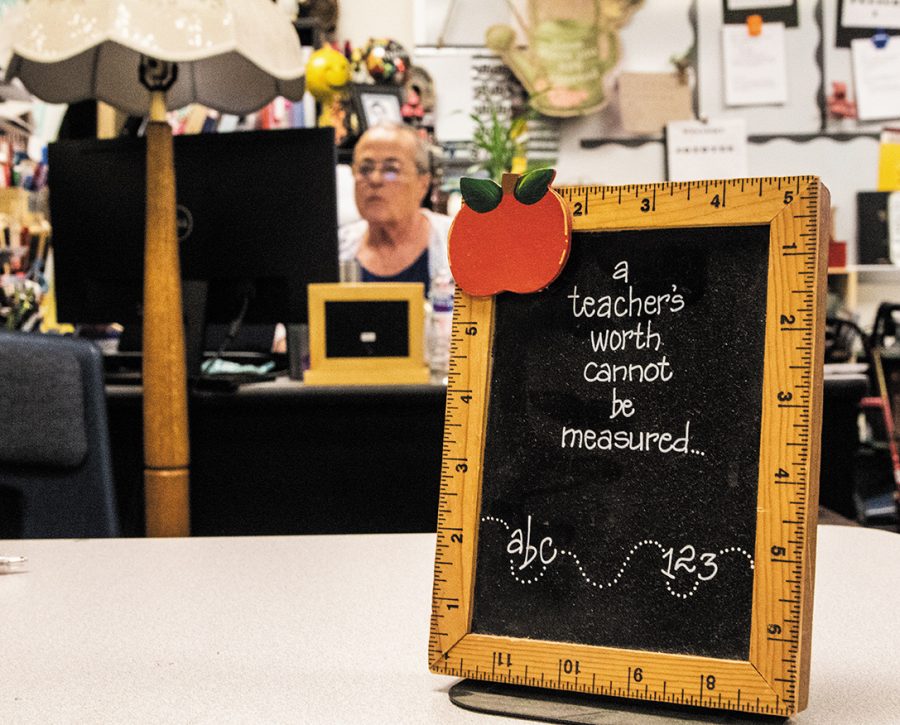One breath at a time
Lung cancer diagnosis left English teacher with difficult decision to make
English teacher Lorraine Cannon works on her computer during second period. The framed art in the foreground was an anonymous gift that now encourages her every time she walks past it to her desk.
May 17, 2019
As Lorraine Cannon watched a girls volleyball game last fall, she saw s current and former students bump, spike and dig the ball during an intense match against the Mesquite Wildcats.
Cannon’s mood quickly shifted from excitement to concern. A wave of uneasiness washed over her body. She could not breathe and left the game without drawing attention to herself.
She walked to her car and calmly called her daughter asking to meet her at the emergency room.
She knew something was seriously wrong and drove fearlessly to Banner Ironwood Hospital gasping for air.
“I wasn’t feeling anything,” Cannon said. “They put oxygen on me and I didn’t know what was going on. I’ve never been in a situation where I couldn’t breathe.”
Cannon’s lungs collapsed and she was rushed into surgery and remained hospitalized for 14 days.
But Cannon was not out of the woods yet. A CAT scan revealed that she had lung cancer.
Doctors operated on her lungs and believed they removed all the cancerous cells. As a precaution, she started chemotherapy.
“For a week and a half I threw up,” Cannon said. “I couldn’t keep anything down and when I went back for my next chemo treatment they couldn’t give it to me because I was so dehydrated even though I drank water.”
The treatments took a toll on Cannon; they would leave her sick and out of work for days. So she was faced with a challenging decision.
“Here’s the deal, if I have to be sick for months on end, I would prefer not to do chemo,” Cannon said. “I’ve got too much going on at school and my kids need me, so I decided to stop the chemo and kind of play russian roulette on a daily basis.”
Cannon is taking a gamble, the cancer could still be in her body but she is willing to sacrifice her health for her responsibilities at school.
“Until it knocks me off my feet I might as well enjoy life as much as I can, then be sick all the time,” Cannon said.
A 42 year career taught Cannon that being there for her students is her top priority. Teaching allows her to be more active and escape her health concerns.
“As long as I’m able to reach my students and teach them on a daily basis instead of being sick it’s better for me to be active then sit at home and twiddle my thumbs,” Cannon said.
After her husband died years ago, one of Cannon’s greatest accomplishments was raising her children to be active, participating members of society. Her children have been there with her through all of her recent despair.
“My daughter has been a rock and stood by me the whole nine yards,” Cannon said.
“She’s always there.”
Cannon has faced many other life challenges alone.
To Cannon it’s important to be willing to accept help, but also to be able to take care of yourself.
She tries to prepare her students for similar situations, not only by example, but also through her words.
“They need to be accountable, somebody’s not always gonna be there to pick them up,” Cannon said. “So they need to put on their boots and make their own life instead of sitting and waiting for other people to make it for them.”
Regardless of the hardships she’s endured, Cannon learned that it is not only possible, but crucial to take charge.
“People tend to not do things. They get sad or depressed. But if you focus on your life and say to yourself that’s not gonna control me, I’m gonna control my life, this is what I’m going to do,” Cannon said.
Life may never get easier for Cannon, however, as time goes on, each obstacle may become easier to overcome.
“Instead of giving up on life you need to embrace it,” Cannon said.



